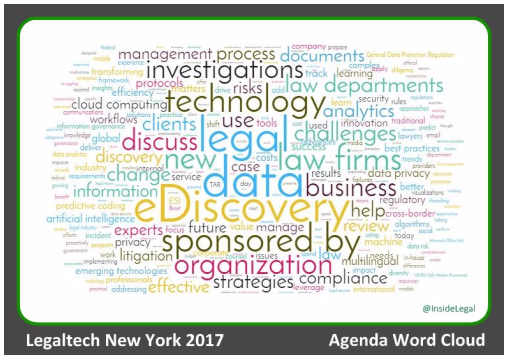Welcome to LegalTech New York 2017!: eDiscovery Trends
Today is the start of LegalWeek 2017 – which includes of course the marquee event LegalTech® New York (LTNY) – and, for the seventh(!) year in a row, eDiscovery Daily is here to report about the latest eDiscovery trends being discussed at the show. Over the next three days, we will provide a description each day of some of the sessions related to eDiscovery to give you a sense of the topics being covered. If you’re in the New York area, I encourage you to check out the show – there are a number of sessions (both paid and free) available and at least 182 exhibitors providing information on their products and services.
While at the show, we will (as always) be interviewing several industry thought leaders to see what they think are the significant trends for 2017 and, which of those are evident at LTNY. After the show, we will announce the series of thought leader interviews and identify when each will be published. Mark your calendars!
American Lawyer Media (ALM) has redesigned their site so that all three days are on a single page, so you can’t really perform a “find” anymore to get the number of hits for “discovery” or “information governance” for the day. Nonetheless, based on Monday’s post, there is still plenty to talk about! Sessions in the main conference tracks include:
12:45 – 1:45 PM:
EDRM & NOT eDiscovery?
For more than a decade, the EDRM framework has served as guidance during the legal discovery process. Today, these principles are being applied in different scenarios and contexts to assist industries with challenges such as data migration, company mergers and acquisitions, divestitures, and more. Join us for an interactive discussion with a global panel of legal, technical, and corporate operational professionals to discuss these unique applications of the EDRM.
Speakers to include: Moderator: Darren Pauling, Managing Director, Forensic Technology, KPMG; Panelists: Seth Eichenholtz, Head of Electronic Discovery, Mastercard, Jeff Sharer, Partner and Co-Chair – Data Law Practice, Akerman LLP, Julie Heller, Global Head of eDiscovery Programs, AIG.
Shielding the Organization from Data Risk & E-Discovery Failures
Data risk can strike an organization from many angles – from external attacks to internal malfeasance to third party negligence – and have real consequences for the e-discovery process. How do security risks such as data leakage, shadow IT and third party negligence lead to e-discovery failures? And how can organizations eliminate preventable e-discovery mistakes such as failure to preserve, failure to protect and the inadvertent release of privileged information? Attend this panel to discuss who bears responsibility and how to prevent failures while instituting best practices in light of the latest case law and new federal rules.
Speakers to include: Moderator: Jason Ray, Managing Director, FTI Technology; Panelists: Ignatius Grande, Senior Discovery Attorney, Hughes Hubbard, Jordan Razza, Senior Counsel and Director of U.S. Litigation, Diageo, Matthew Fisher, Global Head of Records and Information Management, Diageo.
2:15 – 3:15 PM:
eDiscovery, the Cloud & Beyond
Join us for a collaborative conversation about strategies, technologies, and workflows surrounding eDiscovery and the Cloud. Our panel of professionals will discuss pre-migration considerations, implications for preservation and collection, the potential to perform “in place” culling, and opportunities for Information Governance and Litigation Readiness. Being able to adapt strategies to the cloud will provide a roadmap for the future while driving down the cost of eDiscovery.
Speakers to include: Moderator: Brett Trizzino, KPMG; Panelists: Thane Vallette, Associate General Counsel, HP, Bonnie Kennedy, eDiscovery Manager, Delta, Jeff Nass, Senior Counsel – eDiscovery, Boehringer Ingelheim.
Corporate Data Assessments: The New Game Changer?
Where do you begin in implementing a data governance and security plan? How to secure executive buy-in? How can you incorporate shifting regulatory frameworks to ensure compliance? What if you plan to move to Microsoft Office 365? How does this impact your broader data management strategy? These are just some of the questions that can stymie and stall corporate data governance initiatives. Increasingly, corporations are shifting to a data assessment model, which can help proactively 1) identify threats, 2) map an organization’s data universe and 3) help identify an action plan that is presentable to the c-suite. Attend this session to learn more about what these data assessments should incorporate, who should be involved, and how you can customize the data assessment to your own organizational needs.
Speakers to include: Moderator: Jake Frazier, Senior Managing Director, FTI Technology; Panelist: Judy S. Lao, Chief Legal Officer, Blackstone Group, Ben Robbins, E-Discovery and Information Governance, LinkedIn, Jenya Moshkovich, Partner, Barnes & Thornburg, Jason C. Stearns, Director, BlackRock.
3:45 – 4:45 PM:
The Future of Analytical Strategies
It’s no secret that company data volumes and the costs to manage them continue to grow at exponential rates. The application of advanced analytical technologies and methodologies are helping company legal departments by providing critical insight into data in effective, timely, and affordable ways. During this discussion, industry professionals will share their strategies and experiences using emerging tools, technologies, and workflows in various combinations to quickly and effectively understand populations of both structured and unstructured data as well as the impact of these approaches on legal departments.
Speakers to include: Moderator: Tom Keegan, KPMG; Panelists: Michelle Six, eDiscovery Counsel, Kirkland & Ellis, Brett Tarr, Counsel-Litigation & E-Discovery, Caesar’s Entertainment, Erick Drobinski, eDiscovery Counsel, Gilead Sciences.
Advice from Counsel: Data and Risk-Intensive Investigations
From corporate fraud and IP theft to regulatory investigations, legal teams are hard-pressed to quickly find, understand and act upon data in investigations. What are some of the strategies that top legal teams use to proactively prepare for data-intensive investigations? Which analytics tools are best suited for uncovering different pieces of information? How can you balance investigative needs with adherence to various data privacy and State Secrets laws? This panel represents the 5th consecutive year FTI will present the results of our annual Advice from Counsel corporate law survey at LTNY. Showcasing case studies and best practices from leading legal teams, this session is one not to miss!
Speakers to include: Moderator: Sophie Ross, Senior Managing Director, FTI Technology; Panelists: Marla Crawford, Vice President, Associate General Counsel, Goldman Sachs, Jessica Ross, Counsel, Deutsche Bank, Kelly Clay, Senior Counsel, GSK, Ari Kaplan, Principal, Ari Kaplan Advisors.
In addition to these, there are other eDiscovery-related sessions today. For a complete description for all sessions today (and for the entire show, since they’re all on one page), click here.
So, what do you think? Are you planning to attend LTNY this year? Please share any comments you might have or if you’d like to know more about a particular topic.
Disclaimer: The views represented herein are exclusively the views of the author, and do not necessarily represent the views held by CloudNine. eDiscovery Daily is made available by CloudNine solely for educational purposes to provide general information about general eDiscovery principles and not to provide specific legal advice applicable to any particular circumstance. eDiscovery Daily should not be used as a substitute for competent legal advice from a lawyer you have retained and who has agreed to represent you.







